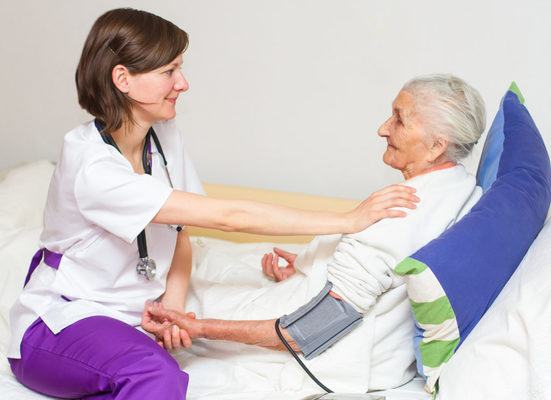Dealing With Chicago Nursing Home Neglect or Chicago Nursing Home Abuse? Here's What You Need To Know And To Do If You Suspect It.
There are three things you have to do if a loved one has been injured or abused in a nursing home.
An estimated 12 million Americans require long term-term care. By 2050, the number of people paying for long-term care could be as high as 27 million.
As the number of elderly people grows, so does the number of elderly people who are abused while in the care of a nursing home. And that means more Chicago Nursing Home Abuse.
Although many cases of elder abuse go unreported, it’s estimated that 1 in 10 experience some form of abuse.
Several have been enacted to combat elder abuse. But the first and most important step to fighting for our growing population of elderly people is to report the abuse. Unfortunately, many professionals and individuals don’t know how to report elder abuse.
In this guide, we explain what elder abuse is, how to detect the signs and how to report mistreatment. Keep reading to find out how to report elder abuse. It could help you save a life one day.

When a nursing home does not turn a nursing home resident, or otherwise move their body for them when they cannot, bedsores can develop. That is nursing home neglect. Basically, it means that they are treating a nursing home resident like a peice of furniture. An inanimate object instead of a human being who needs attention and care.
Another example is if a resident cannot walk. They will need help to go to the bathroom or shower. They will need help to do most things. When they do not get the help they need, that is nursing home neglect, too.
Nursing home abuse happens when a resident is hit or beaten or even sexually assaulted. Nursing home residents are often helpless, and many cannot communucaate well. It makes abuse cases the 'worst of thew worst' because we all know only the lowest sorts of people prey on the helpless.
The short answer is that if you or a loved one got hurt in a nursing home, then yes. And if they were abused or sexually assaulted or raped in a nursing home, then my advice would be that you MUST consult with a nursing home lawyer.
Nursing home lawyers offer a free consultation. That means you can get answers to your questions and know what the next steps are. You can know if the case is strong and what evidence has to be collected to win. And there is never a fee or charge unless you win your case.
If you or a loved one needs to speak with a Chicago nursing home abuse lawyer, please give me a call. Do not delay.
You can call any day, at any time. My people always pick up this phone. And it really is free.
Any person that cares for, or is involved in the care of, an elderly person, can potentially abuse that person.
When elderly people can no longer take care of themselves, they often rely on the care of several individuals. This includes family, nurses, doctors, at-home caregivers, long-term care professionals, and employees of long-term care facilities.
Elder abuse comes in many forms but always has the same consequences. Elderly abuse results in harm or loss to the person being abused.
Domestic violence, exploitation of finances, neglect, physical abuse, psychological abuse, and sexual abuse are some of the common forms of elderly abuse.
These forms of abuse often go unreported. The person being abused may not see loved ones that they trust with this information or loved ones may not know what to do about the abuse. Sometimes, the person being abused fears retaliation for reporting the mistreatment or they are unable to verbalize the abuse due to a loss of cognitive or physical function.
Abuse can also be hard to recognize and may go unnoticed. It’s critical that loved ones, as well as anybody involved in elderly care, knows how to recognize the signs of abuse.

Below are the common forms of elder abuse and the signs to look for:
This involves unsolicited touching, fondling, intercourse or any other sexual activity. If the elderly person is unable to consent, has been threatened or physically forced to participate in sexual activity, it’s a form of sexual abuse. Physical marks may be an indication of sexual abuse.
This includes verbal assault, threats, harassment as well as intimidation. This form of abuse is difficult to detect but it could cause fear of a caregiver, disconnection from loved ones or acting-out in unusual ways.
Often resulting in injury, the signs can be anything from scratches and cuts to broken bones.
When an elderly person is restrained or isolated for reasons other than medical reasons, this is a form of abuse.
An abuser may deny medication, care, shelter, food or other necessary physical assistance. This can result in physical, mental and emotional harm.
This affects an elderly person’s ability to care for themselves. Signs include checks that are unaccounted for, inability to make payments, missing credit cards or property and insufficient bank account funds.
This encompasses anything from not washing clothing to not providing necessary care. Common signs of neglect include unsanitary living conditions, bedsores, dehydration, malnutrition or unexplained medical conditions. All of this, unfortunately is common Chicago Nursing Home Abuse.
The first thing you should do if you suspect nursing home abuse is have a presence at the nursing home. Visiting once a week is good. More than once a week is even better. Get your family and friends involved.
I can tell you that it is a fact that the staff at nursing homes usually pay more attention to patients with frequent visitors. That’s because they know you are watching them, so they do a better job of tending to your loved one’s needs.
Making sure your loved one has visitors and those visitors ask questions means that the staff is going to take better care of your loved one. It also means that you will discover abuse or neglect or injury much faster.

The second thing you should do if you suspect injury, abuse or neglect of your loved one at a nursing home is to make a formal complaint. Report the nursing home to the Illinois Department of Public Health.
The Nursing Home Hotline is 800-252-4343. You can make a complaint at that phone number and the State of Illinois will investigate the nursing home for violating State and federal rules and they will get to the bottom of whether your loved one has been abused.
This report helps a nursing home lawyer in bringing a case against the nursing home. Even if the report comes back with no violation you may still have a valid nursing home abuse case. But getting the state involved is a great idea that can really help a nursing home abuse and neglect case.
Once you take this important step, nursing home abuse attorneys in Chicago can step in to help you determine if you have a case.
The third thing I recommend to do if you suspect abuse or neglect is to move your loved one to a different nursing home. This is especially important if you have multiple disagreements with the staff or if you report the nursing home to the State for investigation. Nursing home staff are human beings.
We would like to think that as human beings, they would have compassion for the elderly or the ill. But like all human beings, they are capable of being petty and taking revenge on your loved one because you’ve complained that they are not getting adequate care.
Once you have a strong intuition or evidence of wrongdoing by the nursing home, you should immediately begin making plans to move your loved one to a different facility to avoid further Chicago nursing home abuse.
Your name may remain confidential when reporting depending on how severe the abuse is, how you report it and where you reported it. In some cases, your name and participation will be required to move forward with an investigation.
There are many ways to report elder abuse. Some offer confidentiality and some do not.
However, you shouldn’t be afraid of retaliation for reporting abuse. In most cases, you are protected from being demoted, laid off or verbal harassment after reporting elderly abuse.
First, you should look into hiring an attorney. An attorney who handles elder abuse cases can advise you on what damages you are entitled to and what steps to take next.
If the elderly person involved was injured as a result of abuse, it is possible that you can file a personal injury lawsuit against the nursing home. Personal injury can be the result of anything from physical abuse to negligence.
If the victim’s medications or medical treatment suffered as a result of the abuse, you may also be able to file a lawsuit for medical malpractice.
The nursing home may not be aware of the abuse that’s going on. It’s critical to contact them so they’re aware of a potential abuser and can take appropriate action. This could stop the abuser from hurting anybody else in the future.
An experienced nursing home abuse attorney can help you pursue your case and get your loved one the justice they deserve.
If you have a loved one or a friend in a nursing home and you encounter any kind of abuse, contact us today and arrange a free, no-obligation consultation with a Chicago nursing home abuse attorney in Chicago.
Just call me at my 24/7/365 toll free number 312-500-4500 and we will be happy to speak with you and answer your questions. Give us your name and mailing address and I will mail it to you free of charge and with no obligation.
Would you like to know more about signs of nursing home abuse and neglect? Click here!
If you or a loved one is dealing with a situation like this, give us a call any time, day or night. We are here to help. 312-500-4500


Scott DeSalvo founded DeSalvo Law to help injured people throughout Chicago and surrounding suburbs. Licensed to practice law in Illinois since 1998, IARDC #6244452, Scott has represented over 3,000 clients in personal injury, workers compensation, and accident cases.
No Fee Unless You Win | Free Consultation | 24/7 Availability Call or Text: (312) 500-4500
>>Read More
Main Office:
1000 Jorie Blvd Ste 204
Oak Brook, IL 60523
New Cases: 312-500-4500
Office: 312-895-0545
Fax: 866-629-1817
service@desalvolaw.com
Chicago and Other Suburban Offices
By Appointment Only